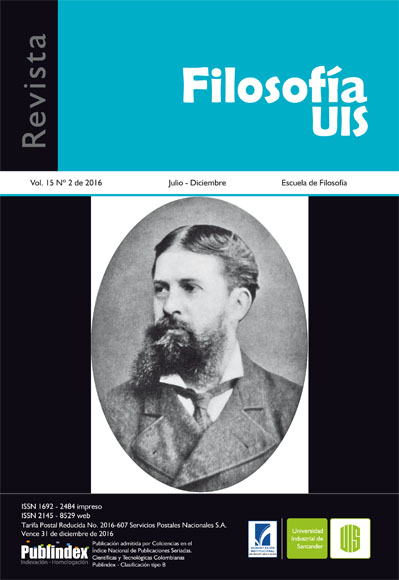Publicado 30-11-2016
Palabras clave
- mente,
- forma,
- apariencia,
- realidad,
- eternidad
Cómo citar
Derechos de autor 2016 Revista Filosofía UIS

Esta obra está bajo una licencia internacional Creative Commons Atribución 4.0.
Resumen
El objetivo de este trabajo es interpretar la Germania de Tácito en tanto texto etnográfico y autoetnográfico, i.e. como crítico de la sociedad romana. Se rechazan los presupuestos filosóficos de “No Place like Rome: Identity and Difference in The Germania of Tacitus” de Ellen O’Gorman (§1), se analiza la escritura etnográfica de Tácito a través de la guerra y el comercio, enfatizando las ideas de forma, belleza, materia, mores y mente (§2). Por último, se destaca el uso utópico y de crítica interna que adquiere el texto de Tácito (§3).
Descargas
Citas
- Ash, R. (Ed.). (2012). Tacitus (Oxford Readings in Classical Studies). Oxford: Oxford University Press.
- Boissier, G. (1904). Tacite. Paris: Hachette.
- Caesar (1958). Bellum Gallicum / The Gallic War. H. J. Edwards (Ed.). London: Harvard University Press- Heinemann.
- Cioran, E.M. (1999 [1960]). Histoire et utopie. Paris : Gallimard.
- Dench, E. (2007). “Ethnography and History”. Marincola, J. (Ed.) A Companion to Greek and Roman Historiography, Vol. II. Singapore: Blackwell.
- Derrida, J. (1979 [1967]). L’écriture et la différence. Paris: Éditions du Seuil.
- Derrida, J. (1989). La escritura y la diferencia. Barcelona: Anthropos.
- Gudeman, A. (1900). “The Sources of the Germania”. En Transactions and proceedings of the American Philological Association, (31) , 93-111.
- Hartog, F. (2003). El espejo de Heródoto. México:Fondo de Cultura Económica.
- Heidegger, M. (1957). Identität und Differenz. Stuttgart: Klett-Cotta.
- Krebs, C. B. (2011). A Most Dangerous Book. Tacitus’s Germania from the Roman Empire to the Third Reich. New York–London: W.W. Norton & Co.
- Momigliano, A. (1984 [1960]). “Some Observations on Causes of War in Ancient Historiography” Secondo contributo alla storia degli studi classici. Roma: Edizioni di Storia e Letteratura.
- O’Gorman, E. (1993). “No Place like Rome: Identity and Difference in the Germania of Tacitus”. Ramus, 22 (2), 135-154.
- Oxford Latin Dictionary (1968). Oxford: Clarendon.
- Proust, M. (1984 [1913]). À la recherche du temps perdu. 1. Du côté de chez Swann.
- Rives, J. (2012). “Germania”Pagán, V.E. (Ed.). A Companion to Tacitus. MaldenOxford: Willey-Blackwell.
- Ross, J. W. (1878). Tacitus and Bracciolini: The Annals forged in the XVth Century. London: Diprose & Bateman.
- Salluste (1924). De coniuratione Catilinae / Conjuration de Catilina / Bellum Iugurthinum / Guerre de Jugurtha. B. Ornstein y J.Roman ](Eds). Paris: Les Belles Lettres.
- Suetonius (1914). Lives of the Caesar. J. C. Rolfe (Tras.). Massachusetts: Harvard University Press.
- Syme, R. (1958). Tacitus. Vol.1. Oxford: Clarendon.
- Tacite (1921). Histoires. H. Goelzer (Ed.). Paris: Les Belles Lettres.
- Tacite (1922). Dialogue des orateurs / Vie D’Agricola / La Germanie. H. Goelz, H.
- Bornecque, G. Rabaud (Eds.). Paris: Les Belles Lettres.
- Tacite (1923). Annales. H. Goelzer (Ed.). Paris: Les Belles Lettres.
- Tácito (2001). Agrícola / Germania / Diálogo sobre los oradores. J.M. Requejo (Ed.).Gredos. Madrid.
- Tácito (2001). Anales. J.L. Moralejo (Ed.). Gredos: Madrid.
- Tacito (1983). La Germania. Canali (Ed.). Pordenone: Studio Tesi.
- Tacitus (1914). Dialogus. Agricola. Germania. W. Peterson M. Hutton (Eds.). London-New York: Heinemann-MacMillan.
- Tacitus (2007). Germania. M. Fuhrmann (Ed.). Stuttgart: Reclam.
- Thomas, R. (1982). Lands and Peoples in Roman Poetry: The Ethnographical Tradition. Cambridge.
- Thomas, R. (2009). “The Germania as a Literary Text”. The Cambridge Companion to Tacitus. Woodman, A. (Ed.). Cambridge: Cambridge University Press.
- Thompson, M. (2007) “Primitive or Ideal? Gender and Ethnocentrism in Roman Accounts of Germany”. Studies in Mediterranean Antiquity and Classics, 1.
